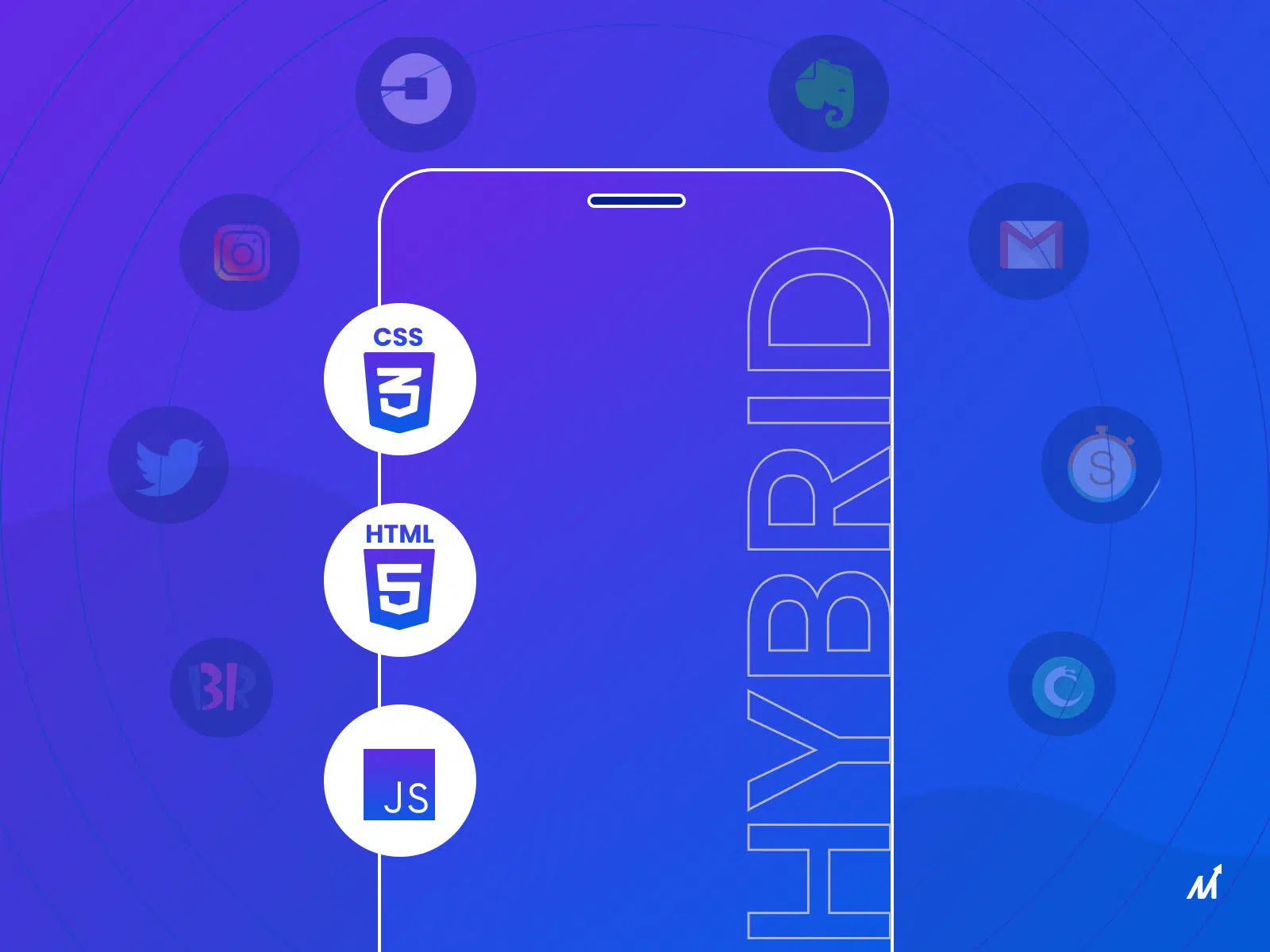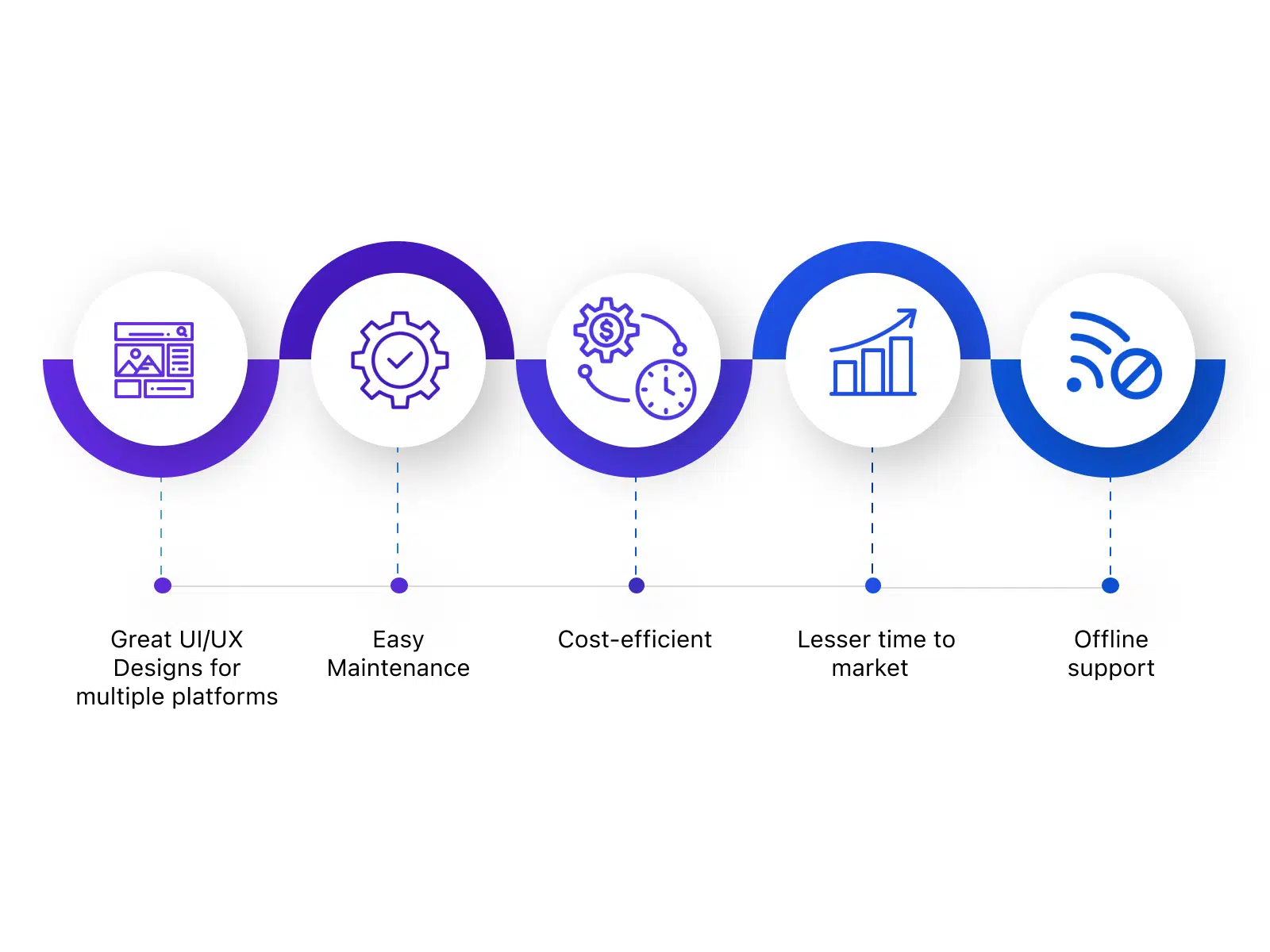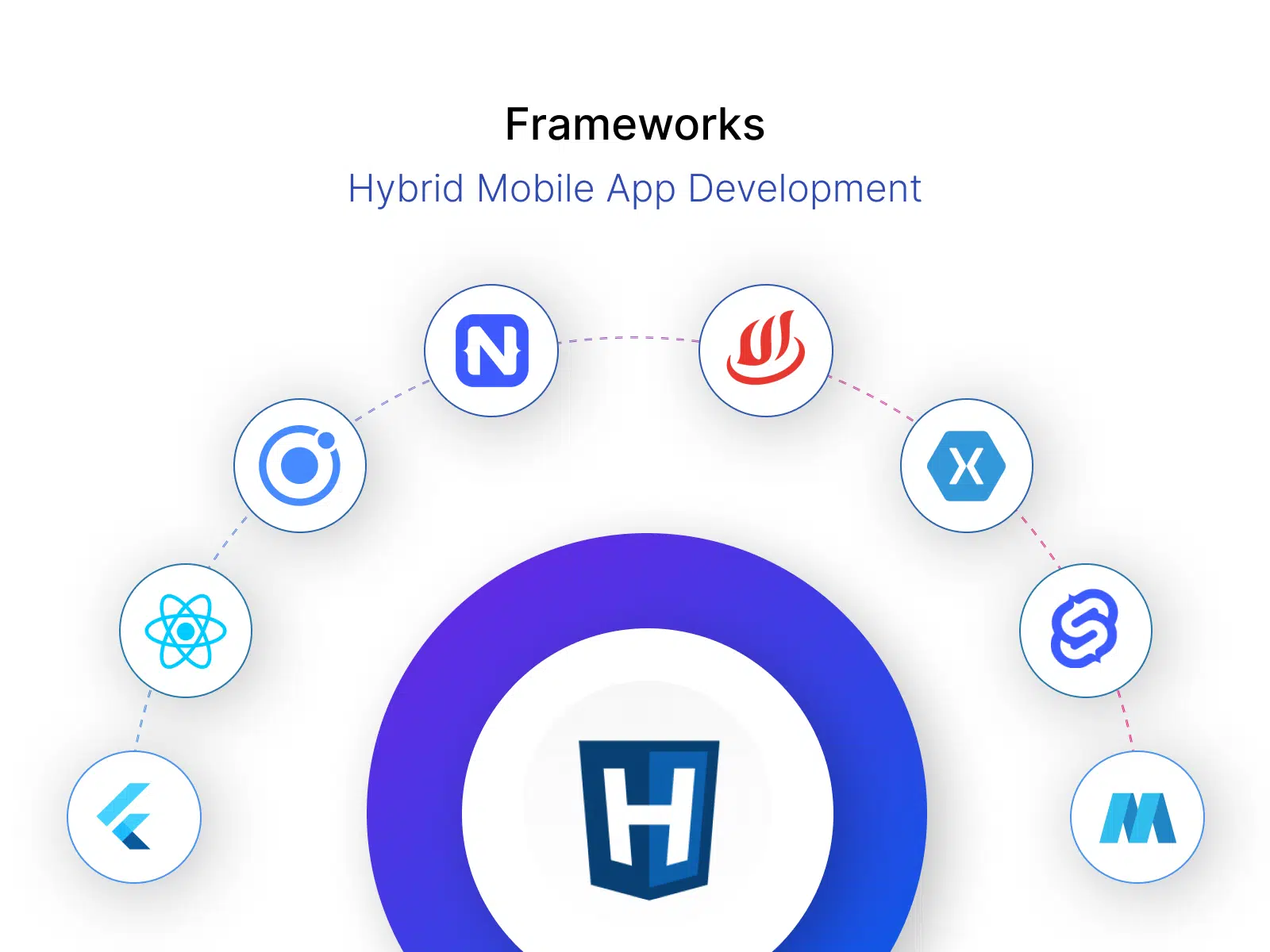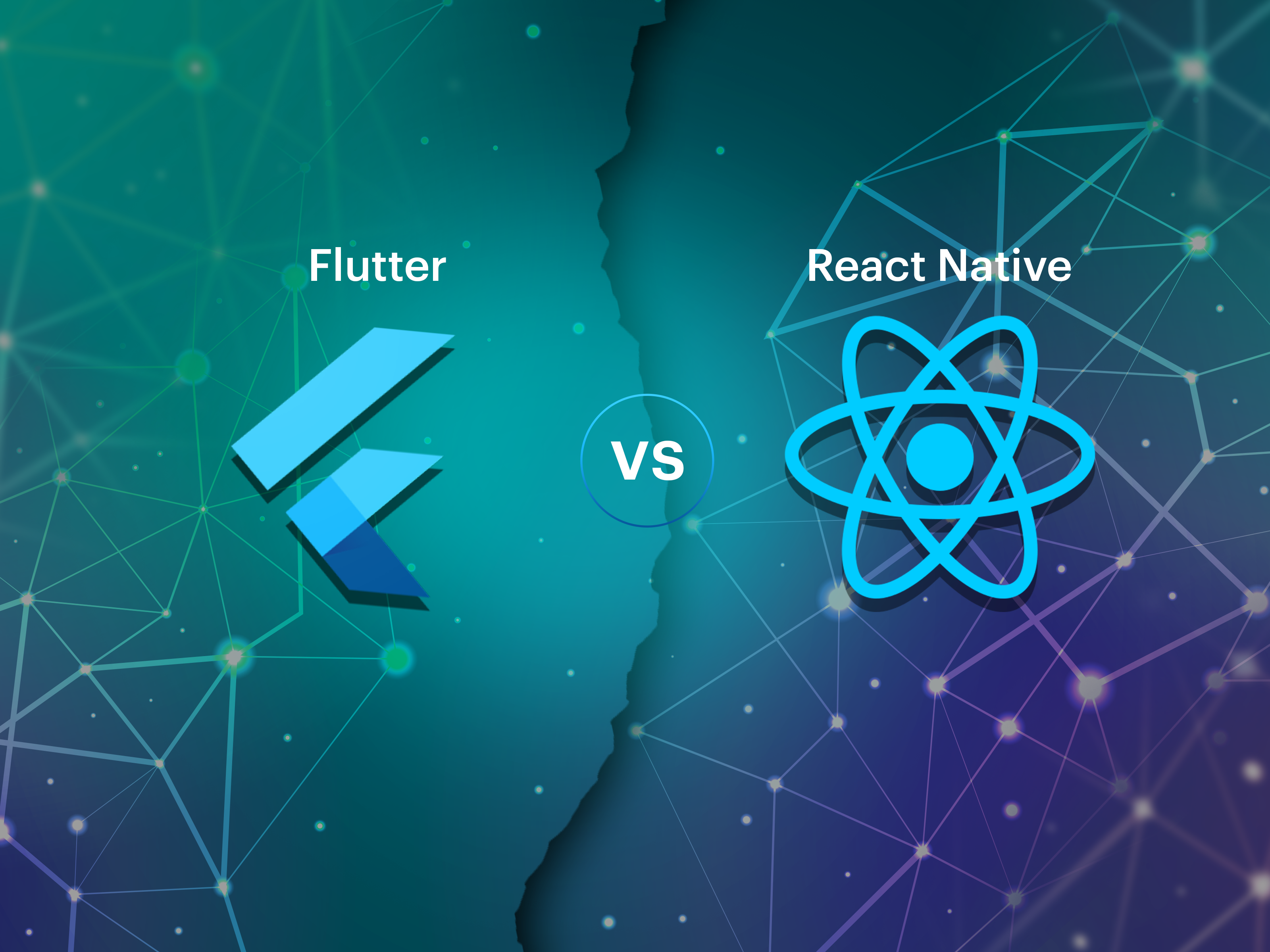Hybrid Mobile App Development: Introduction
The number of downloads in the App market is projected to reach 235,261.9 million in 2022. The growing demand for apps has resulted in various technologies being integrated into the app development process to become more customized and suit multiple platforms and needs. But is hybrid mobile app development the future of mobile app development for your business?
While we have native apps, which are developed for a particular platform like iOS, Windows, or Android, web apps also give a native-app-like feel using the browser instead of the mobile’s operating system. Hybrid mobile apps combine the features of both of the above. These are executed natively inside a container but use web technologies such as HTML and JavaScript during development.
In summary, hybrid mobile app development is essentially web app development that is downloaded and then runs on the device using a simplified browser, thus integrating features of both native and web apps.
Hybrid Mobile App Development: Crucial To Stay Relevant
Hybrid Mobile App Development knowledge is considered necessary, especially by businesses, since it provides a great development strategy. In terms of cost and time, hybrid mobile apps are considered the best option, helping companies cut costs by almost 70%.
This helps the organization grow and be more productive and create efficient apps without worrying about the requirements of different platforms while providing additional functionality and flexibility.
Hybrid apps are thus considered the future, considering the fast-paced world and continuous technological innovation.
Top Benefits Of Hybrid Mobile App Development
1. Great UI/UX Designs For Multiple Platforms
Hybrid app frameworks offer a great user experience and a wide range of UI elements to create an attractive interface. It offers smooth performance on Android and iOS, regarding factors such as loading time or lack of performance difference for different platforms. The business can thus target a more extensive customer base.
2. Easy Maintenance
In native apps, version support becomes a big problem since it must be changed each time a new operating system comes into the market. Hybrid mobile apps do not have this limitation, and their version and platform support are one of their biggest strengths. They also do not involve complex languages during the development phase, making the app easier to maintain and debug.
3. Cost-Efficient
Instead of hiring different developer teams to create the same app for other platforms, businesses can cut down on this cost since a single codebase is developed for multiple platforms using hybrid app frameworks. This is quite beneficial for users who are just starting a venture or want to provide high-quality performance to various users at a much lower cost, resulting in a great ROI.
4. Lesser Time To Market
Hybrid apps have much less development time, owing to the simple languages, a single developer team for multiple platforms, and the wide range of advanced frameworks available. This also can help the businesses if they want to develop an MVP, which can help to gather a loyal customer base from the beginning and reduce errors that might come up in the future.
5. Offline Support
One of the most significant advantages is hybrid apps can work without any internet connection. This is possible due to data recovery since the data used by these apps are stored locally with the help of APIs. This increases the reach of hybrid apps to people who live in areas with a poor internet connection or who are frequently in transit and encounter network problems from time to time.
Frameworks Used For Hybrid Mobile App Development
1. Flutter
Released by Google in 2017, Flutter is one of the most evolving hybrid mobile apps development frameworks. It uses Dart for developing applications for both Android and iOS. It’s free, open-source, and popular for its many UI widgets and highly customizable themes. It also has a hot reloading feature, where a developer can see the app changes in real time.
2. React Native
Considered one of the used frameworks, React Native uses JavaScript to give the app a native-like feel instead of using languages Java or Objective-C. Almost 95% of the code is compatible with cross-platform. React Native’s closeness to the native app experience and ready-made components speed up the development process.
3. Ionic
The Ionic application claims that there are over 30 million downloads per month, which is growing. Ionic uses Angular and HTML to build beautiful designs and create robust and high-performance apps for multiple platforms with the help of a single code. It is fast, has extensive documentation, and provides high-quality components, which help to reduce development time.
4. NativeScript
Created by Progress, Nativescript uses Angular, TypeScript, or JavaScript to develop apps from a single codebase. It gives a platform-native UI without WebViews and runs with native performance. It has deep integrations with Angular and Vue, which enables features like CLI, code generation, and router support.
5. Onsen UI
A JavaScript-based open-source UI framework, Onsen UI allows developers to create hybrid apps using HTML, CSS, and Javascript. Developers use the Cordova/Phonegap command line for developing hybrid apps. Onsen UI contains various UI components, such as infinite scroll, carousels, and dialogs. Developers consider it an easy-to-learn framework with optimized features and a responsive design.
6. Xamarin
Xamarin helps you create amazing apps for all platforms, whether Windows, iOS, or Android. Founded by Microsoft, it is based on the C# language. Developers widely adopt Xamarin for its code reusability and cost-effectiveness. You can create native user experiences and get insight into user analytics and crash reporting. It also earns recognition for its comprehensive documentation and tutorials.
7. Svelte Native
This framework is comparatively quite new and combines the features of Nativscript and Svelte. Svelte Native offers a new, compile-step approach to getting fully functional native-like apps instead of doing most of the work on the mobile device itself.
8. Mobile Angular UI
Developers use Mobile Angular UI as an open-source framework for developing hybrid mobile apps. They provide excellent components such as navbars, sections, dropdowns, and accordions. It utilizes Angular JS and Bootstrap technologies for development, which developers extensively use during web development.
Possible Drawbacks Of Hybrid Mobile App Development
1. Compromise On Performance
Compared to native apps, the performance offered by hybrid apps is slower, and big and complex apps might suffer. Since the interaction between the operating system and source code is not direct and through a framework, which further calls APIs and components, there is a degradation in the application speed.
2. Limited Capabilities
Hybrid apps utilize the phone’s features to some extent but do not support complex parts and cannot fully utilize hardware capabilities. These apps are not extremely high quality or stable compared to native apps and might not be feasible if your app is highly high-tech and demanding in terms of features. Developers also cannot integrate 3D elements and technologies such as AR/VR.
3. Delay In Updates
If there is an update in the Android or IOS system, it takes time to reflect on hybrid apps. Developers would need to add a new feature to support the update, which is time-consuming compared to native apps with faster SDKs.
Hybrid Mobile App Development: Markovate’s Experience & Take
Markovate provides Hybrid App Development Services to help your enterprises grow and accelerate your applications. We create robust cross-platform apps, combining the functionalities of both native and web apps. Our goal is to deliver a flawless application in the least possible time. We provide end-to-end app development services.
Thus, from designing the prototypes to developing the codebase and looking after testing and maintenance, our developers ensure that the app is user-friendly and as close to native apps as they can be in terms of functionality, performance, and user experience. Our approached and experienced team created hybrid apps which are agile, scalable and have a well-designed user interface.
Further Read: Native vs Hybrid vs Web: Which To Choose For App Development?
Hybrid Mobile App Development: FAQs
1. Which are some top companies and businesses using hybrid apps?
Companies like Twitter, BMW, NMG, and A3logics use hybrid apps to create budget-friendly, high-performance application solutions.
2. Does the cost of native apps and hybrid apps differ? Which one is higher?
Yes, the cost of native apps and hybrid apps does differ. Early-stage businesses prefer hybrid apps because native app development is a costlier process.
3. Which hybrid app development tools are the most popular?
Tools like Xamarin, HTML, Javascript, Ionic and Onsen UI are popular for developing efficient and attractive Hybrid Apps.









